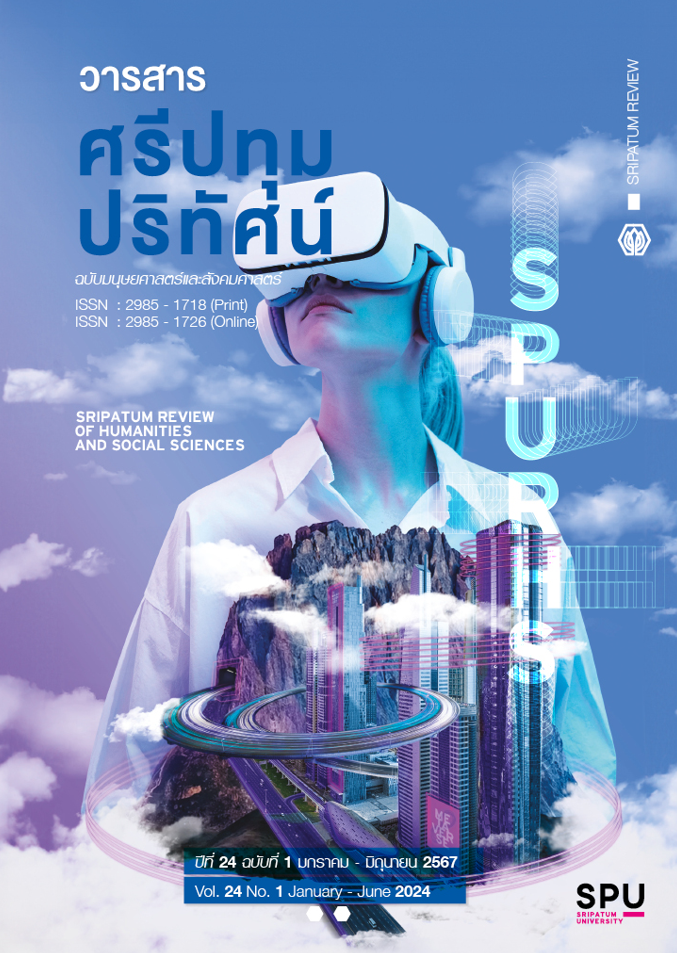Current situation and relationship between hospital workers' out-group trust and job satisfaction before hospital mergers — a merger study based on a combined Grade A tertiary hospital in Ningbo, China
Main Article Content
บทคัดย่อ
This study aims to analyze the current situation and the relationship between out-group trust and job satisfaction among hospital workers in anticipation of hospital mergers. Using the Out-group Trust Scale and Job Satisfaction Scale, a questionnaire was conducted on 713 hospital workers in Grade-A tertiary hospital CDH in China. Factors influencing out-group trust and job satisfaction were examined through an independent sample t-test and one-way analysis of variance. Correlation testing and regression analysis were employed to explore the role of out-group trust in job satisfaction. The research revealed that the overall out-group trust and job satisfaction of hospital workers in Hospital CDH before the merger were at a medium level. Factors such as gender, age, education, years of work, and predicted time of merger were found to affect out-group trust and job satisfaction. Furthermore, the occupation of hospital staff only influenced job satisfaction. Notably, out-group trust demonstrated a direct positive effect on job satisfaction. The study concludes that there is a need for increased attention to the psychological changes of hospital workers before a merger, as evidenced by the findings from Hospital CDH. The insights gained from this research provide valuable reference points for organizations undergoing mergers and emphasize the importance of addressing the well-being of employees during such transitions.
Article Details

อนุญาตภายใต้เงื่อนไข Creative Commons Attribution-NonCommercial-NoDerivatives 4.0 International License.
1. กองบรรณาธิการสงวนสิทธิ์ในการพิจารณาและตัดสินการตีพิมพ์บทความในวารสาร
2. บทความทุกเรื่องจะได้รับการตรวจสอบทางวิชาการโดยผู้ทรงคุณวุฒิ แต่ข้อความและเนื้อหาในบทความที่ตีพิมพ์เป็นความรับผิดชอบของผู้เขียนแต่เพียงผู้เดียว มิใช่ความคิดเห็นและความรับผิดชอบของมหาวิทยาลัยศรีปทุม
3.การคัดลอกอ้างอิงต้องดำเนินการตามการปฏิบัติในหมู่นักวิชาการโดยทั่วไป และสอดคล้องกับกฎหมายที่เกี่ยวข้อง
เอกสารอ้างอิง
Bansal, A. (2016). Employee trust dynamics during organizational change: A context of mergers and acquisitions. Asia-Pacific Journal of Business Administration, 8(1), 55-69.
Basalamah, M. S., & As’ad, A. (2021). The role of work motivation and work environment in improving job satisfaction. Golden Ratio of Human Resource Management, 1(2), 94–103.
Chen, S., Li, X., & Han, Y. (2017). The Relation of Intergroup Contact and Out-group Trust: Mediator Role of In-group Identification. Psychological Exploration, 37(1), 54-58.
Degbey, W. Y., Rodgers, P., Kromah, M. D., & Weber, Y. (2021). The impact of psychological ownership on employee retention in mergers and acquisitions. Human Resource Management Review, 31(3), 1-46.
Delhey, J., & Welzel, C. (2012). Generalizing trust: How outgroup-trust grows beyond ingroup-trust. World Values Research, WVR, 5(3), 45-69.
Faye, K., & Long, Y. (2014). The impact of job satisfaction in the relationships between workplace politics and work related outcomes and attitudes: evidence from organizations in Senegal. International Journal of Business and Management, 9(5), 160-168.
Gaertner, S. L., & Dovidio, J. F. (2014). Reducing intergroup bias: The Common In-group Identity Model. Routledge.
Greve, H. R., & Man Zhang, C. (2017). Institutional logics and power sources: Merger and Acquisition Decisions. Academy of Management Journal, 60(2), 671–694.
Hu, B., & Chen, J. (2003). Empirical research on working satisfaction of mental worker. Science Research Management, 24(4),139-144.
Huang, Q., & Zhao, Y. (2013). Tolerance, perceived social distance, and perceived conflict as meditational factors of the effect of imagined intergroup contact on perceived intergroup threat. In Psychology and innovation ability improvement—Proceedings of the 16th Chinese Psychology Academic Conference (pp. 1244–1245).
Kehoe, R. R., & Wright, P. M. (2010). The impact of high-performance human resource practices on employees’ attitudes and behaviors. Journal of Management, 39(2), 366–391.
Lekić, N., Vapa–Tankosić, J., Rajaković–Mijailović, J., & Lekić, S. (2019). An analysis of factors influencing employee job satisfaction in a public sector. E M Ekonomie a Management, 22(3), 83–99.
Lipponen, J., Wisse, B., & Jetten, J. (2017). The different paths to post-merger identification for employees from high and low status pre-merger organizations. Journal of Organizational Behavior, 38(5), 692-711.
Liu,Y., Long, L., & Li, Y. (2007). The Unique Effects of Organizational Justice Dimensions on Key Organizational Outcomes. Management World, (3), 126-132.
Ma, W. (2021). Research on employee satisfaction improvement strategies after corporate mergers and acquisitions—taking XC Group and Q Company as examples (dissertation). China Academic Journal Electronic Publishing House.
Maguire, S., & Phillips, N. (2008). ‘citibankers’ at Citigroup: A study of the loss of Institutional Trust after a merger. Journal of Management Studies, 45(2), 372–401.
Mohamed, M. S., Kader, M. M. A., & Anisa, H. (2012). Relationship among organizational commitment, trust and job satisfaction: An empirical study in banking industry. Research Journal of Management Sciences SSN, 1(2), 1-6.
Mühlhaus, J., & Bouwmeester, O. (2016). The paradoxical effect of self-categorization on work stress in a high-status occupation: Insights from management consulting. Human Relations, 69(9), 1823-1852.
Noor, M., James Brown, R., & Prentice, G. (2008). Precursors and mediators of intergroup reconciliation in Northern Ireland: A new model. British Journal of Social Psychology, 47(3), 481-495.
Obrenovic, B., Jianguo, D., Khudaykulov, A., & Khan, M. A. (2020). Work-family conflict impact on psychological safety and psychological well-being: A job performance model. Frontiers in Psychology, 11,
Raziq, A., & Maulabakhsh, R. (2015). Impact of working environment on job satisfaction. Procedia Economics and Finance, 23, 717-725.
Sarıkaya, Ş., & Kara, B. K. (2020). Organizational trust and organizational support as a predictor of job satisfaction. International journal of curriculum and instruction, 12, 435-466.
Wang, Y., & Pan, Q. (2014). Generation Mechanism of Teachers’ Organizational Silence:Mediating Role of Organizational Trust and Psychological Empowerment. Educational Research, 35(4), 106–115.
Yang, F., & Wei, X. (2016). An empirical study on the impact of organizational trust on new employee job satisfaction. Jiangxi Social Science, 36(6), 210–216.
Yao, L. (2022, August 29). Policy interpretation: ningbo city’s implementation plan for promoting the high-quality development of public hospitals. Ningbo Municipal Health Commission. Retrieved August 30, 2022, from https://www.ningbo.gov.cn/art/2022/8/29/art_1229096003_1750006.html.
Yzerbyt, V., Judd, C. M., & Corneille, O. (2004). The psychology of group perception perceived variability, entitativity, and essentialism. Psychology Press.
Zeng, J., Hu, P., & Jiang, Y. (2010). A Positive Analysis to the Influence of Employees’ Organizational Trust on Their Work Attitude. Journal of Technical Economics & Management, (3), 67–70.
Zhang, X., & Xu, B. (2018). Social Classification Process and Its Impacts on Interpersonal Trust in M&A – A Mediated Moderation Model. Journal of Business Economics, 26(9), 46-55.


